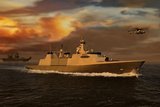Thales eyes Brazilian requirements
Thales is positioning its Kingklip Mk2 sonar to meet the requirements of the Brazilian Navy.
The company’s Brazilian subsidiary Omnisys recently obtained certification for the Kingklip as a strategic defence product as part of the group's work to develop advanced sonar solutions in Brazil. Through Omnisys, Thales will invest over €5 million in the local production of transducers, to build an industrial infrastructure to manufacture sonar equipment in Brazil.
Brazil is seeking a new class of four corvettes under its Tamandaré programme.
Kingklip Mk2 is a medium-frequency active and passive hull-mounted sonar for multi-purpose corvettes and frigates. It performs permanent torpedo and underwater obstacle avoidance functions and offers multi-static interoperability with Thales' Captas and Flash sonars.
More from Naval Warfare
-
![Spain’s F100 upgrade mirrors Aegis modernisation paths in allied navies]()
Spain’s F100 upgrade mirrors Aegis modernisation paths in allied navies
The Spanish Navy’s Alvaro de Bazan-class of air defence frigates will receive the latest Aegis Weapon System technology among other modernisations to extend the service life to 2045.
-
![UK’s Fleet Solid Support ship programme deemed on track despite steel supply concerns]()
UK’s Fleet Solid Support ship programme deemed on track despite steel supply concerns
Shipbuilders are saying the programme is going ahead on time as the government estimates 7.7 million tonnes of steel are needed for 2026 infrastructure projects.
-
![As Indonesia doubles up its order, who else is looking at the Arrowhead 140 frigate design?]()
As Indonesia doubles up its order, who else is looking at the Arrowhead 140 frigate design?
The adaptable design of Babcock’s Arrowhead 140 frigate, already selected by the UK Royal Navy and Poland, has led to more orders from Indonesia while other countries continue to weigh it up.






















